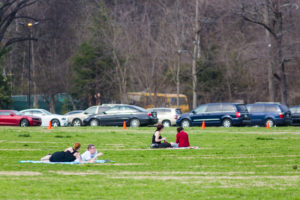Greensward project moves forward
 Overton Park Conservancy’s Board of Directors has voted unanimously to authorize the release of $250,000 to the City of Memphis, and we will ask City Council to accept these funds at Tuesday’s meeting. This contribution represents 50% of the costs for the design and engineering phase of the reconfigured Zoo parking lot. While this is a major financial commitment, the Conservancy is committed to moving forward with the project that will end three decades of parking on the Greensward.
Overton Park Conservancy’s Board of Directors has voted unanimously to authorize the release of $250,000 to the City of Memphis, and we will ask City Council to accept these funds at Tuesday’s meeting. This contribution represents 50% of the costs for the design and engineering phase of the reconfigured Zoo parking lot. While this is a major financial commitment, the Conservancy is committed to moving forward with the project that will end three decades of parking on the Greensward.
Powers Hill Design will lead the reconfiguration project, which will ultimately return the majority of space that has been used for Zoo overflow parking to the people of Memphis for recreational use. Powers Hill was selected in January by a steering committee of representatives from Overton Park Conservancy, the Memphis Zoo, the City of Memphis, and the community. Their thoughtful approach and experience with low-impact environmental design make this team an ideal fit for this complex project.
We anticipate a spring start to the design phase, which will include a robust public engagement process. When the engineering phase concludes, likely this fall, we will have cost estimates for the construction and implementation phase. At that time, a funding plan for completion of the project will be finalized.
We are confident that the Powers Hill team will be able to deliver a solution that is practical, implementable, and sensitive to the importance of the park and the Zoo to Memphians and visitors. The community has already put in significant work to shape this plan through the parking and traffic study conducted last year. The collaborative efforts that helped us reach this consensus solution will continue to be valuable as we bring the project to fruition.
Greensward aeration set for later this month
Additionally, we’ll be hiring contractors to aerate the entire Greensward within the next several weeks, in preparation for another busy season. There will be a tractor-like vehicle making small holes in the ground. This process reduces compaction in the soil, making it easier for roots to spread so that grass can grow at a healthy rate.



